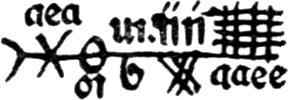Auraicept na n-éces
Auraicept na n-éces, translation of George Calder, p. 79-83:
Who invented this speech, and in what place was it invented, and at what time was it invented? Not hard. Fenius Farsaidh invented it at the Tower of Nimrod at the end of ten years after the dispersion in every direction from the Tower, and it was every one speaking the same language that went there unto its territory and not every one of the same stock, as e.g., Cai Cainbreathach, pupil of Fenius Farsaidh, one of the 72 scholars of the school. He was a Hebrew by origin and he was sent to Egypt.
And there Fenius himself remained, at the Tower, and there he dwelt so that there the school asked of him to select for them a select language out of the many languages which they had brought with them from abroad so that that speech might not be in the possession of anyone else but of themselves alone, or of anyone who should learn it with them again.
Then was selected their language out of the many languages, and it was attributed to one man of them so that it is his name which is upon this language. That man was Gaedel, son of Angen, so that Gaedil, Gaels, is derived from him, from Gaedel son of Angen son of Whiteknee son of Whitehand son of Greek Agnumon. Now Gaedel son of Aimergen is the same as Gaedel son of Ether, to wit, his father bore two names, Aingen and Ether.
It was there accordingly that this language was regulated. What was best accordingly of every language and what was widest and finest was selected for Gaelic; and for every sound for which no characters were found in all the other alphabets, characters were by them found for these in the Beithe Luis Nin of the Ogham, ut est:

Therefore its vowels were placed apart and its consonants also apart, so that every one of them stands apart from the other. Semivowels do not exist, as they do not exist with the Greeks, but only the mutes. For every element, for which there was no name in the other languages, names were found in Gaelic, ut est, grus, curds; cloch, stone; and linn, pool.
I beheld the lis Past which would come a stream, In which its curds were many Though milk was not abundant.
What was best, widest, and finest of every language was put by them into Gaelic, to wit, what was easier and pleasanter to say, to wit, they thought having vowels and mutes in it easier and pleasanter than semi-vowels, mutes, and vowels as the Latinist has.
Better in reason with them, to wit, five of them for a long and five of them for a short, and five of them for soft sounds and five for a hard, and five for a full sound and five for a diphthong than the one five underlying all of them as it is with the Latinist, and this is what the Latinist says: His five vowels all take that effect, ut est: Latina vacates omnes et product et corripi possunt, that is, all the Latin vowels are such that they can be lengthened or shortened.
Broader in letters, to wit, for there is nothing the Latinist has to correspond with that: broader in respect of meanings, words, and letters, to wit, broader in letters ᚛ᚒᚗᚘᚙ (unicode from here).

The Latinist has nothing to correspond with it: broader in words, to wit, grus, curds; cloch, stone; lind, pool, the Latinist has nothing to correspond with those;
curd, that is a cheese: galmula with the Latinist, curds with the Gael: to correspond with the Latinist's galmarium is the Gael's cheese: galmalam with the Latinist, gruthrach with the Gael: "stirabout" with the Gael, there is nothing answering to that with the Latinist:
lapis with the Latinist, stone with the Gael: petra with the Latinist, rock with the Gael: scopulus with the Latinist, sharp pebble with the Gael. Cloch, onn, and ailcne, however, these are kinds of stones to which the Latinist has nothing corresponding:
aqua with the Latinist, water with the Gael; amnis with the Latinist, river with the Gael; piscina with the Latinist, fish-pool with the Gael; to the Gael's pool, however, the Latinist has nothing corresponding.
Hence then, the Gael is wider in words and letters than the Latinist [!!]. What the Latinist says is that though Gaelic is wider in words and letters, it is not wider in meanings; for though the Gael has many names in denoting the things, the relative meaning emerges out of the paucity of words which the Latinist does have. That is not true, as the Latinist himself says: Nisi scieris nomen, cognitio rerum periit, i.e., the knowledge of the things perishes, unless the name is known.
And that turns us to Saint Isidore's Etymologiae:
VII. De Nomine. Nomen dictum quasi notamen, quod nobis vocabulo suo res notas efficiat. Nisi enim nomen scieris, cognitio rerum perit.
Any clue about why twitter would not work for me? ; )
